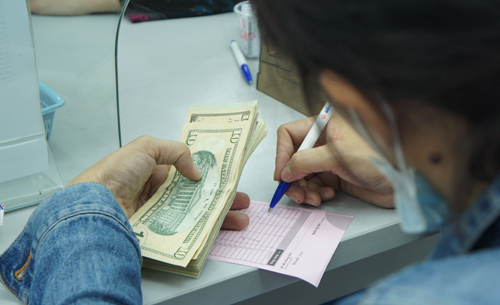Trading in foreign currencies or gold via foreign exchange (forex) trading floors is illegal in Vietnam as currently there are no specific regulations on business activities through forex trading platforms, a State Bank of Vietnam (SBV) official told local media on Sunday.
Forex trading conducted through accounts is a form of margin trading in which the net worth of the accounts are constantly re-evaluated according to the fluctuations of currency exchange rates or changes in the prices of commodities and raw materials, including gold, said Nguyen Quang Huy , director of the SBV’s Foreign Exchange Management Department at a press conference in Hanoi.
“Forex trading via exchange floors is not a kind of trading activity intended to satisfy the foreign exchange needs of a nation, but it is purely a speculation,” he said.
According to Huy, local organizations and individuals can only carry out foreign exchange transactions in accordance with SBV rules with an authorized credit institution.
Other exchange activities must be allowed by the Prime Minister and licensed by the SBV, Huy said.
Despite never being treated as a legal trading activity, a number of local organizations and individuals have engaged in this kind of trading in Vietnam, he added.
"In addition to legal risks in which rule breakers can be fined up to VND50-100 million, organizations and individuals also face the risk of paying a transaction fee to trading floor owners without knowing that they can intervene in the transaction process in ways that are detrimental the traders,” Tuan warned.
“In particular, the forex market is the most fluctuating and unpredictable among financial markets,” he remarked. “As investors in Vietnam still have limited access to information, the risk of losses is very high," he said.
This is the first time the SBV has stated its views on forex trading after announcing a ban on gold trading via accounts, which took effective in March 2010.
However, the SBV found that many underground exchange floors still operate widely in Vietnam.
In HCMC alone, dozens of companies are now participating in those activities.
| Former banking tycoon Nguyen Duc Kien, who was arrested in August 2012 for economic violations that caused dire consequences to many local banks, was reported to lose VND433 billion ($20.6 million) for trading in gold on a foreign-based exchange floor when gold prices fluctuated wildly in the 2009-2011 period. Kien’s firm, Thien Nam Export-Import and Production Development Corp, carried out business activities related to this field though it was never licensed to buy and sell gold, according to investigators. As of July 30, 2010, Thien Nam made 49 transactions with 150,000 ounces of gold before closing its account on that foreign trading floor the same year. In addition, Thien Nam Co also participated in trading in physical gold domestically, buying and selling a quantity of 37,500 taels of SJC bullion. (1 tael = 37.5 grams) |




















































